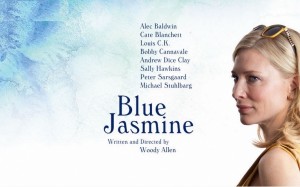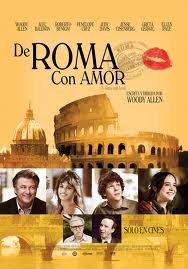Trailer: Aloha from Cameron Crowe, with Bradley Cooper, Emma Stone, Rachel McAdams, and Bill Murray
Posted on February 15, 2015 at 8:00 am
I love Cameron Crowe movies, and this looks like one of the best.
Posted on February 15, 2015 at 8:00 am
I love Cameron Crowe movies, and this looks like one of the best.
Posted on January 12, 2014 at 3:49 pm
As we prepare for this week’s release of the Jack Ryan prequel, “Shadow Recruit,” you might want to take a look at the other thrillers based on Tom Clancy’s dashing hero. Watch how each one of these stories reflects its era.
The Hunt for Red October (1990) Alec Baldwin played Ryan with an all-star cast including Sean Connery, Scott Glenn, James Earl Jones, and Fred Thompson, in a story about a Soviet submarine captain who wants to defect.
Patriot Games (1992) Harrison Ford took over as Ryan, who foils an IRA terrorist attack and then himself becomes the target.
Clear and Present Danger (1994) Ford again, this time pulled into an illegal US war against a Colombian drug cartel.
The Sum of All Fears (2002) Ben Affleck took over as a younger Jack Ryan, who has to stop a terrorist attack at a Baltimore football game.
Posted on August 1, 2013 at 6:00 pm
Two sisters. One imagines herself living a life of ease, comfort, graciousness, and elegance that does not really exist. The other is more accepting of her lower middle class life, her carnality, her limited expectations. The first sister loses everything and comes to live with the second. Woody Allen may have been inspired by Tennessee Williams’ “Streetcar Named Desire” in this modern San Francisco story of two sisters, one desperately trying to hold herself together for one more shot at a wealthy husband and the other more realistic but still holding on to some notion of romance. 
Cate Blanchett plays the self-named Jasmine, who lived in blissful — if willful — ignorance as a one-percenter, married to Hal, a wealthy businessman (Alec Baldwin). She floated from Pilates to shopping to gala to spa as he shifted funds from one shady offshore corporation to another. She would shake her impeccably coiffed head and murmur that she had no head for business and he would chuckle indulgently and pull another diamond bracelet out of his pocket. She and her sister Ginger (Sally Hawkins) were both adopted and were never close. But family is family, and when Hal goes to jail for Bernie Madoff-style fraud, Jasmine has no money and nowhere else to go. We first see her on the plane from New York to San Francisco, telling the woman sitting next to her what is clearly a story she has told many times before, about her first meeting with Hal, when “Blue Moon” was playing, and about their fairy tale ending of luxury and parties. She ignores the ugly “ever after” the way she glosses over the evident boredom of her listener, turning from annoyance to pity and then discomfort.
Blanchett, who has played Williams’ fragile Blanche on stage, is magnificent as Jasmine, a narcissistic woman who has been coddled and in denial for so long that she does not have the strength of mind or spirit to engage in an honest appraisal of her situation. Ginger is only slightly better. She can ask Jasmine how (and, by implication, why) someone without any money would travel first class and seems to have few illusions about the economic or emotional prospects with her rough-hewn fiancé, Chili (Bobby Cannavale). She does not hold a grudge over the money she lost by investing with Hal or the destructive impact it had on her first marriage to Augie (Andrew Dice Clay in a nicely textured performance). But she, too, has some illusions, and is easily taken in when she meets Al (Louis C.K.) a man who seems to have the stability and finesse that Chili does not.
Longtime Allen collaborator Santo Loquasto evokes the contrasting worlds of the two sisters with impeccably evocative production design and Sonia Grandes costumes are quite literally right on the money, with Jasmine’s gorgeous Chanels and Hermes and Ginger’s shapeless, cheap glamor. Even the expensive bag she selects as a gift from Jasmine is superficially glittery. The cinematography by Javier Aguirresarobe is so gorgeous it might even make Alvy Singer leave his heart in San Francisco.
But this movie is easier to admire than to like. It has some points to make about superficiality and corruption, but there is no one to root for or care about. The last act twist is telegraphed a third of the way in and the issues it raises are quickly abandoned. Allen as a director is still getting better, but as a screenwriter he needs to do a few more drafts.
Parents should know that this film includes sexual references and non-explicit situations, adultery, fraud, drinking, drug use, smoking, and strong language.
Family discussion: Why is it important that the sisters were adopted? Which one made poorer choices about men? What will happen to them next?
If you like this, try: “Crimes and Misdemeanors,” another Woody Allen film about contrasting siblings confronting life choices
Posted on November 20, 2012 at 9:48 pm
The daughter of writer/illustrator William Joyce (“Dinosaur Bob,” “Robots”) once asked him whether the Easter bunny knew Santa Claus and that inspired him to create a series of stories about the characters of fantasy and folklore who care for children. They come together in an Avengers or X-Men-style team known as The Guardians in this visually rich but cluttered film.
Those characters are a Slavic-accented, scimitar-wielding Santa (Alec Baldwin) with “naughty” and “nice” tattooed on his burly arms, an Easter bunny with an Aussie accent and a lot of attitude (Hugh Jackman), a silent sandman who communicates with dreamy designs made from glistening specks, and the feathered Tooth Fairy (Isla Fisher), who presides over a battalion of hummingbird-sized minions who collect baby teeth and leave coins while children sleep. When the happiness and comfort of the children of the world is threatened by the Boogeyman (Jude Law), they need more help and so they invite Jack Frost (Chris Pine) to join them, explaining that they are responsible for making sure the children of the earth have “wonder, hope, and dreams.”
Jack is a loner, haunted by not being able to remember anything before he woke one day in the ice, somehow knowing that his job was to bring the fun of winter to children. At first he has no interest in joining the others. But when he makes things worse, he has to help make them better.
It’s a sweet idea and there are witty and charming moments and some lovely visuals, especially the sandman, the elves, and the iridescent little tooth fairies. Like all great villains, Law has an English accent and sounds nicely sneery. But the storyline gets lost in a whirlwind of locations and plot twists. Each of the characters has its own mythology and home base and alliances. The goal of the Guardians is for children to have faith in them, so it makes no sense that they accomplish that only by showing themselves, which is proof, not faith. There is no suggestion that some of the world’s children may not have these characters as a part of their traditions or faiths. While the movie asks its characters and its audience to find their centers, the story itself is oddly hollow.
Parents should know that this fim has a scary villain, characters in peril, a sword-wielding Santa, a character who sacrifices himself to save a sibling, and issues of believing in fantasy characters.
Family discussion: How are the characters different from what you expected? What do they have in common? Which is your favorite and why?
If you like this, try: the book, Guardians of Childhood by William Joyce and the movie “Robots”
Posted on June 28, 2012 at 6:09 pm
 The quality of Woody Allen’s films is incidental, even coincidental. Woody Allen and Adam Sandler may occupy opposite ends of the comedy spectrum when it comes to their audiences and cultural touchstones. Sandler’s touchstones are “I Love the 80’s” faded celebrities and Allen’s are philosophers, New York, and jazz musicians. But they have more in common than their mutual fixations with nostalgia, male characters afflicted with arrested development, and sex. Both, thanks to the enabling devotion of their dedicated audiences, are enabled to make movies that are closer to conceptual art than fully-realized story-telling.
The quality of Woody Allen’s films is incidental, even coincidental. Woody Allen and Adam Sandler may occupy opposite ends of the comedy spectrum when it comes to their audiences and cultural touchstones. Sandler’s touchstones are “I Love the 80’s” faded celebrities and Allen’s are philosophers, New York, and jazz musicians. But they have more in common than their mutual fixations with nostalgia, male characters afflicted with arrested development, and sex. Both, thanks to the enabling devotion of their dedicated audiences, are enabled to make movies that are closer to conceptual art than fully-realized story-telling.
For Allen, who averages a film a year, his real art form is the perpetual production schedule. The prestige factor means that he can get top actors — both in ability and box office appeal to reassure the budget guys — for microscopic fractions of their usual fees. He keeps the same crew. All he has to do is provide a script. But because his priority is getting the film made rather than awards, critical reception, or selling tickets, movies like “To Rome With Love” feel like they came out of the oven without being fully cooked. It plays like a first draft, or even a handful of random notes grabbed at random from a drawer because the cameras were ready to roll.
Allen continues his tour of the capitals of Europe by setting his story in Rome, or, I should say, stories. A stunningly unoriginal opening shows us an Italian traffic cop, who advises us that Rome has many stories. Like an episode of “The Love Boat” he combines four stories, and these are variations on the themes of love, sex, music, aging, and what one character calls “Ozymondian melancholy,” a nostalgic pre-occupation with the past.
A successful architect (Alec Baldwin) confronts a younger version of himself (“The Social Network’s” Jesse Eisinberg), or perhaps himself as a younger man, to try to prevent him from making a disastrous mistake by betraying his lovely, stable, devoted girlfriend (a criminally underused Greta Gerwig) with her high-maintenance friend (a criminally mis-cast Ellen Page, who is supposed to be seductive and neurotic). A naive newlywed couple from the country come to the big city on their honeymoon. As they prepare to meet his very conservative relatives, who have offered him a high-paid job, they get tangled up in deception that includes a fetching prostitute (Penelope Cruz, one of the film’s highlights) and a predatory movie star. An ordinary man (Oscar winner Roberto Benigni) finds himself inexplicably a celebrity, hounded by paparazzi and fans who are fascinated with the most mundane details of his very mundane life. At first, he enjoys the attention and takes advantage of his fame, but then it becomes tiresome. And Allen himself plays a retired opera director who is visiting his daughter (Allison Pill, who was Zelda Fitzgerald in “Midnight in Paris”) and meet her Italian fiancé He discovers that the fiancé’s father, an undertaker, has a magnificent tenor voice, but only in the shower. There is a lot time spent on extraneous conflicts with the Allen character’s wife (Judy Davis) and the lefty politics of the younger couple that never goes anywhere.
There are some very funny lines and some mild humor from the situations, but the best that can be said of it is that just as not much energy was expended in making it, not much will be required to enjoy and then forget it.